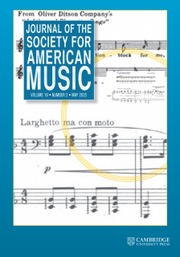No CrossRef data available.
Article contents
Augusta Browne: From Musical Prodigy to Musical Pilgrim in Nineteenth-Century America
Published online by Cambridge University Press: 17 June 2014
Abstract
Augusta Browne Garrett composed at least two hundred piano pieces, songs, duets, hymns, and sacred settings between her birth in Dublin, Ireland, around 1820, and her death in Washington, D.C., in 1882. Judith Tick celebrated Browne as the “most prolific woman composer in America before 1870” in her landmark study American Women Composers before 1870. Browne, however, cast an enduring shadow as an author as well, publishing two books, a dozen poems, several Protestant morality tracts, and more than sixty music essays, nonfiction pieces, and short stories. By means of her prose publications, Augusta Browne “put herself into the text—as into the world, into history—by her own movement,” as feminist writer Hélène Cixous urged of women a century later. Browne maintained a presence in the periodical press for four decades in a literary career that spanned music journalism, memoir, humor, fiction, poetry, and Christian devotional literature, but one essay, “The Music of America” (1845), generated attention through the twentieth century. With much of her work now easily available in digitized sources, Browne's life can be recovered, her music experienced, and her prose reassessed, which taken together yield a rich picture of the struggles, successes, and opinions of a singular participant and witness in American music of her era.
- Type
- Research Article
- Information
- Journal of the Society for American Music , Volume 8 , Issue 2: Musical Women in Nineteenth-Century America , May 2014 , pp. 189 - 218
- Copyright
- Copyright © The Society for American Music 2014


